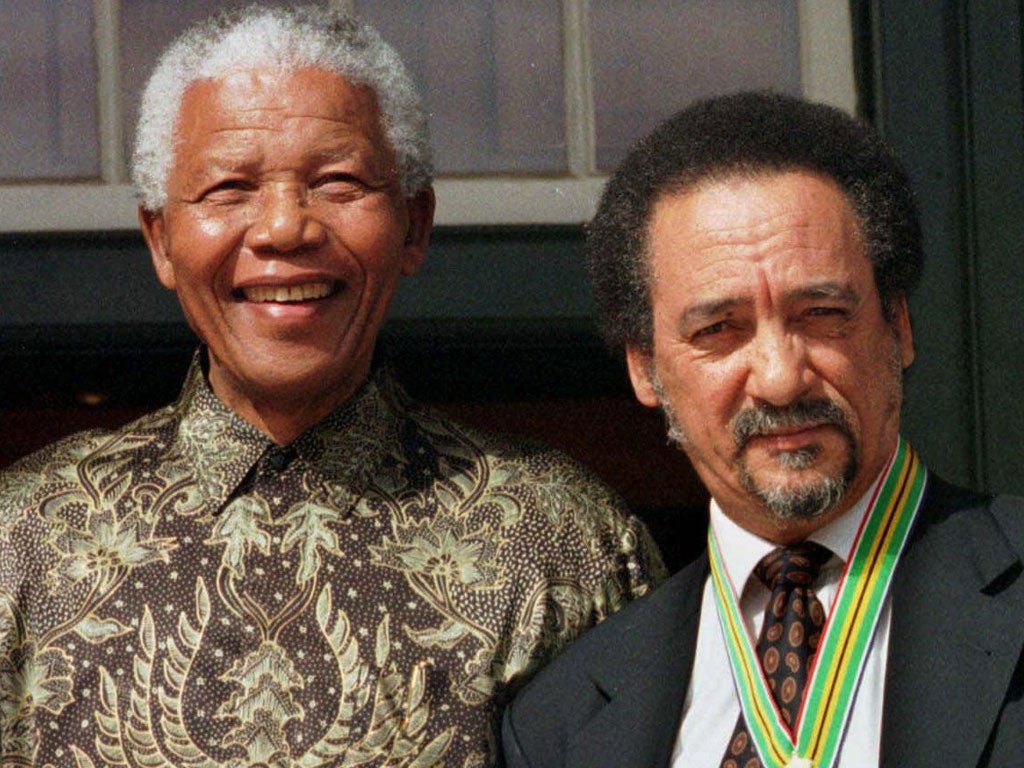
Your support helps us to tell the story
From reproductive rights to climate change to Big Tech, The Independent is on the ground when the story is developing. Whether it's investigating the financials of Elon Musk's pro-Trump PAC or producing our latest documentary, 'The A Word', which shines a light on the American women fighting for reproductive rights, we know how important it is to parse out the facts from the messaging.
At such a critical moment in US history, we need reporters on the ground. Your donation allows us to keep sending journalists to speak to both sides of the story.
The Independent is trusted by Americans across the entire political spectrum. And unlike many other quality news outlets, we choose not to lock Americans out of our reporting and analysis with paywalls. We believe quality journalism should be available to everyone, paid for by those who can afford it.
Your support makes all the difference.Nelson Mandela, at 94, keeps going but those who fought the good fight by his side, his closest associates in politics and his best friends pass on. Jakes Gerwel, who was buried at the weekend in Cape Town, played all three parts. Few people knew it.
Mandela was the star on stage, Gerwel the indispensable man in the shadows, the unsung, unknown soldier vital in the critical mission that Mandela set himself when he assumed the presidency of South Africa in 1994, cementing the country’s new and fragile democracy after nearly 50 years of apartheid and three and a half centuries of domination by the white minority of the population. Gerwel was important because he stood always by Mandela’s side during the five years he ran the country; always by his side and always invisible.
As director general of the presidency (in the White House he would have been known as chief of staff), he was Mandela’s most loyal adviser, a man who knew Mandela as well as Mandela knew himself. Mandela placed absolute trust in Gerwel because he saw in him the shared value of personal integrity above all things, because he grasped he was entirely lacking in political ambition and because, like him, he saw it as his life’s mission to serve his country, not himself.
In this, both Gerwel and the man he served differ from many of those who have succeeded them in government. Born in poverty in 1946, the son of farmworkers in the Western Cape, Gerwel never forgot the ideals that steered him to the political life. Books were his route in. A fanatical reader from an early age in Afrikaans, the language Cape Coloureds like him shared with their old white masters, he became a distinguished professor of literature, and from there rose to the rectorship of the University of the Western Cape, a hotbed of anti-apartheid militancy in the 1980s.
Gerwel made common cause with his students, giving voice to their rebellion, flying to their aid in the face of police repression. He was courageous and was arrested several times, but he never strove for public recognition. By temperament self-effacing, he was the soul of discretion. Mandela, who enjoyed the company of intellectuals, found in him the perfect foil.
As director-general of the presidency between 1994 and 1999, Gerwel was Mandela’s right-hand man, the diligent administrator who ran his office, his political adviser and friend, a person in whom Mandela knew he could confide his doubts and secrets without the slightest possibility that he would ever be betrayed. Gerwel could have won himself powerful allies in politics or in business by sharing the privileged information, both personal and political, he had accumulated during his years by President Mandela’s side; he might have made himself a lot of money by writing up his memoirs of that time, but he never breathed a word.
After abandoning his position in the presidency Gerwel carried on working with Mandela, helping him run the NGO – the Mandela Foundation – to which the former president dedicated his energies after leaving politics. With Gerwel’s passing following heart surgery, South Africa, a nation of heroes, has lost one of its more illustrious sons; few have given so much to so many with less need for glory or fame.
Gert Johannes Gerwel (Jakes) Gerwel, academic and anti-apartheid activist: born Somerset East, South Africa 18 January 1946; Director-General, Office of the President of South Africa 1994-99; Secretary of the Cabinet, Government of National Unity 1994-97; Chancellor, Rhodes University 1999-2012; married Phoebe Abrahams (one son, one daughter); died Cape Town 28 November 2012.
Join our commenting forum
Join thought-provoking conversations, follow other Independent readers and see their replies
Comments